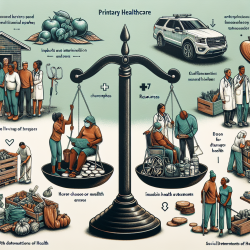Understanding Barriers to Dietary Behavior: A Pathway to Improved Therapy Outcomes
In the realm of healthcare, particularly when dealing with children and their families, understanding the underlying barriers to effective treatment is crucial. The research article titled "Identification of barriers to appropriate dietary behavior in low-income patients with type 2 diabetes mellitus" provides insights that can be invaluable not just for dieticians, but also for speech-language pathologists and other healthcare professionals. The study highlights key obstacles that patients face, which can be extrapolated to understand challenges in other therapeutic contexts.
Key Findings from the Research
The study involved a cross-sectional survey of 98 low-income adults with type 2 diabetes, revealing that taste and cost are the most significant factors in food selection. Stress-induced overeating, temptation to eat unhealthy foods, and the high cost of healthy foods were identified as major barriers. These findings underscore the importance of considering socio-economic and psychological factors when developing treatment plans.
Implications for Practitioners
For practitioners at TinyEYE and beyond, these findings can be transformative. Here’s how you can implement these insights into your practice:
- Holistic Assessment: Incorporate questions about dietary habits and stress management into your initial assessments. Understanding these factors can provide a more comprehensive view of the child's environment and potential barriers to therapy.
- Collaborative Approach: Work closely with dietitians and other healthcare professionals to address dietary barriers. A multidisciplinary approach can help in creating a more supportive environment for the child.
- Tailored Interventions: Design interventions that consider the socio-economic background of the families. For instance, suggest cost-effective dietary changes that align with the family's financial situation.
- Education and Empowerment: Educate families about the impact of diet on overall health and therapy outcomes. Empower them with knowledge and resources to make informed decisions.
Encouraging Further Research
The study also highlights the need for further research into the barriers faced by diverse populations. As practitioners, staying informed about the latest research can enhance your ability to provide effective therapy. Consider conducting your own studies or collaborating with researchers to explore these barriers in the context of speech and language therapy.
Understanding and addressing dietary barriers can lead to improved therapy outcomes and a better quality of life for the children and families you serve. By integrating these insights into your practice, you can make a significant difference in your patients' lives.
To read the original research paper, please follow this link: Identification of barriers to appropriate dietary behavior in low-income patients with type 2 diabetes mellitus.










